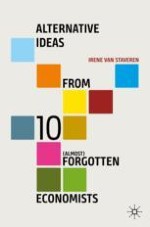2021 | OriginalPaper | Buchkapitel
Chapter 7: Amartya Sen on Financial Capabilities
verfasst von : Irene van Staveren
Erschienen in: Alternative Ideas from 10 (Almost) Forgotten Economists
Aktivieren Sie unsere intelligente Suche, um passende Fachinhalte oder Patente zu finden.
Wählen Sie Textabschnitte aus um mit Künstlicher Intelligenz passenden Patente zu finden. powered by
Markieren Sie Textabschnitte, um KI-gestützt weitere passende Inhalte zu finden. powered by
